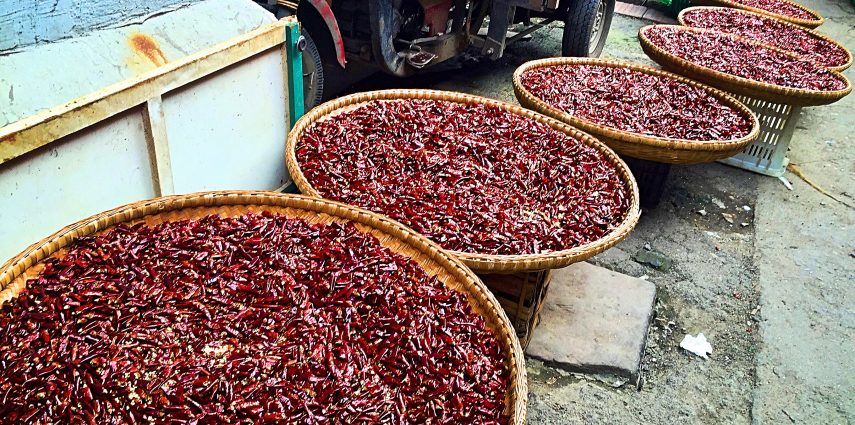Hot hot hot, is that all you got?
First off, I’m a fan of Anthony Bourdain and, needless to say, I’m a big fan of Chengdu and the food here, so when I heard he was in town shooting for Parts Unknown I was excited. It was a sure thing; it was an easy home run. But when the episode aired, I was underwhelmed – the show was a sensational ode to the chili pepper that did little to explore the depths of the flavors in the cuisine and even less to celebrate the incredible culture around food here, which to me, is what makes Chengdu a special place.
The episode plays out like a buddy movie, where Michelin starred chef Eric Ripert is the Jon Favreau to Tony’s Vince Vaughn. Bourdain bullies Ripert into eating more chilis and drinking more bajiu than he expects and laughs at his discomfort. In concept this is entertaining, and there is nothing fundamentally wrong with forcing a high-end French chef out of his comfort zone – in fact its pretty hilarious, and it makes for good TV. It doesn’t however do justice to the city, which merely serves as a backdrop for this Brom-Com (that’s right, bro-mantic comedy) and it didn’t bring the grittiness and effort I expected from Parts Unknown
Let’s start with the spiciness factor in Sichuan food. Sichuan food is spicy, but it’s not that spicy – it uses only dried chilis, and the types of chilis it uses pale in comparison to those used in the Caribbean, Thailand or India in most cases. It’s also a relatively new addition to an ancient cuisine (all chili peppers come from South America, and didn’t make their way to Sichuan until the late 17th Century). There is a complex and diverse flavor palate that exists underneath all the spice. These flavors are highlighted by fermented and pickled ingredients and the Sichuan peppercorn, which doesn’t so much amplify the spice as make the interaction with flavor more physical, more visceral. All this was more or less glossed over for the sensational TV highlights of making Ripert sweat, which again is funny, but also lazy as the show’s entire theme. In Double Cup Love, Eddie Huang, talks about a cold chicken in chili oil dish in great length, describing how its complex flavors could ultimately give a cadaver an erection. In closing he says, “And that’s why distilling a regional palate to modifiers like ‘it’s spicy’ doesn’t work. It’s deeper than that.” Tony’s not worried about boners of subtlety – he just wants to see his friend grimace, and that’s the thesis of the entire show.
Bourdain hung out with a surprisingly title-holding, English-talking crew rather than regular folk on the street, finding the ‘parts and flavors unknown’ to the viewers. The highlight of the show in many ways for me was his morning apart from Ripert where he wandered on his own (though he’s never really alone). Not worrying about what restaurant he ate at or where he was, he sat down for a bowl of noodles at a busy market. Here he was candid, eating the food of the people and in classic/predictable ‘solo white-dude in China’ form, enjoyed a beer with his breakfast. It was local, it was a scene and it was more than spiciness.
The dinner at Yu Zhi Lan, was an interesting addition and I support fully breaking the notion that Chinese food is only street-food and dirty cafeterias, and that only those places can bring authenticity. But again this is no new thing – Fuschia Dunlop has been pumping this place since 2014 and it’s garnered an international reputation since. Dunlop’s involvement did include some good anecdotes, and inspired a discussion about texture (strangely about sea cucumber which is super not-Chengdu) but it also felt tired, and lazy on the producer’s part. We all appreciate what she has done to popularize authentic Chinese food in the west and empower people to cook, and she’s made a living being the only English spokesperson for Sichuan food, but she’s very much the only voice heard. Yes she lived in Chengdu, and went to the culinary school for a few months, but she hasn’t lived here for maybe 20 years. While you could say she doesn’t have her finger on the pulse of the city, the real point is that any discussion benefits from a plurality of contributors and a diversity in opinions. There are plenty of people, both English speaking and non-English speaking (but it’s 2016 that shouldn’t even be an issue), who I think could contribute a lot to the discussion, and drive it forward. And that would be good for everyone.
The cooking school segment, which I’m guessing was Fuschia’s doing (as she made her fame using a course she did here as justification, and this segment props that up as the only true way to experience Sichuan…), didn’t add a ton to the show either. It just serves as a new backdrop for Tony to belittle his not-as-worldly friend. Cooking a new cuisine is hard. Sichuan food is more complex than it looks. Sure, thanks for the insight.
The episode was still entertaining. Bourdain is charismatic and all dick jokes and sensationalism aside, making someone (especially a high end chef from France/NYC) step put of his comfort zone is both hilarious and important -he changes Ripert’s idea about China “I thought it was going to be just a big China town.” And that’s cool. But its focus on entertainment through the ‘hot hot hot’ of the spice and the bromance of its 2 hosts didn’t allow anything that’s special about Chengdu to shine through. Is China still that hard an egg to crack? I don’t think so, but either way its no excuse.

